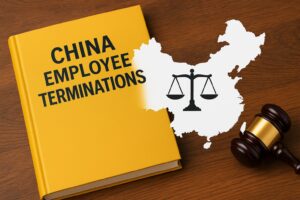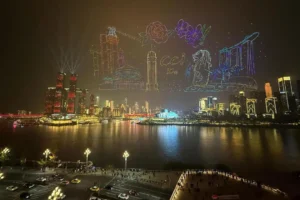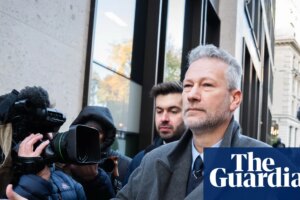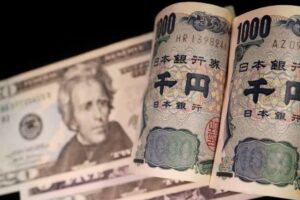
A former Hong Kong politician and prominent democracy campaigner has accused British police of asking her to “self-censor” and “retreat from public life” after officers asked her to agree to avoid public gatherings.
The request, outlined in a signed “memorandum of understanding” seen by the Guardian, has alarmed exiled dissidents who fear it may embolden attempts to silence criticism of Chinese and Hong Kong officials worldwide.
Carmen Lau, who moved to the UK in 2021, was asked to sign the formal agreement in March by Thames Valley police after her neighbours were posted letters offering a £100,000 bounty for information on her movements or for her being taken to authorities.
Thames Valley police requested Lau “cease any activity that is likely to put you at risk” and “avoid attending public gatherings” such as protests.
Lau is wanted by Hong Kong authorities for allegedly contravening the territory’s national security law, which grants sweeping extraterritorial powers to prosecute acts or comments made anywhere in the world that it deems criminal. She also works with the Hong Kong Democracy Council, a Washington-based organisation dedicated to “raising international support for the advancement of its democracy and human rights”.
Tony Chung, a democracy activist who was jailed under Hong Kong’s national security law but now lives in the UK, was also the subject of near-identical letters requesting British citizens inform on him.
While Hong Kong authorities have denied sending the letters, the UK foreign and home secretaries believe they are an example of “transnational repression” and have called on “Chinese and Hong Kong authorities to end the deliberate targeting of opposition voices”. On Friday, David Lammy and Yvette Cooper vowed to protect the “rights and freedoms” of exiled activists in the UK.
The Hong Kong activist Tony Chung was sentenced to 43 months in jail. He now lives in the UK. Photograph: Alex Hofford/EPA
But Lau believes detailed instructions from Thames Valley police in March, days after the letters were discovered, only amplified foreign attempts to silence her.
The bounty letter, which is cited in the memorandum of understanding, states that Lau is wanted due to the political content of her speeches and social media posts that have criticised Hong Kong authorities.
Lau regularly gives speeches criticising the Chinese government’s targeting of dissidents, including at demonstrations in London.
She said the force “essentially told me to self-censor”, adding she felt she had no option but to agree to the request when uniformed officers came to her house, but has not stopped campaigning.
“It is alarming that, instead of safeguarding my right to speak and gather freely in the UK, the response shifts responsibility on to me to limit my basic freedoms in the face of China’s transnational repression,” Lau said.
“In effect, this mirrors the very outcome the Chinese and Hong Kong authorities are seeking: silencing dissent through fear and isolation. A truly democratic response should centre on protecting the rights of those targeted, not advising them to retreat from public life.”
skip past newsletter promotion
Our morning email breaks down the key stories of the day, telling you what’s happening and why it matters
Privacy Notice: Newsletters may contain info about charities, online ads, and content funded by outside parties. For more information see our Privacy Policy. We use Google reCaptcha to protect our website and the Google Privacy Policy and Terms of Service apply.
after newsletter promotion
Thames Valley police said: “We would never confirm or deny details of individuals that we may or may not be safeguarding, nor would we confirm or deny safeguarding tactics that we may or may not use, as this would undermine any such protection.”
Melbourne-based Kevin Yam, who was the subject of almost identical bounty letters and is also wanted for his criticism of Hong Kong authorities, said the request was starkly different to the approach taken by Australian police, which “always treated me as the victim in the situation”.
“I am dismayed by the UK authorities’ tepid responses to the letter dropping campaign against Carmen Lau and Tony Chung, to the point that I believe it has emboldened the perpetrators to try their luck in another country, namely Australia,” Yam said.
The bounty letters are being separately investigated by the Metropolitan police’s counter-terrorism unit. In a statement, the force said it was “alive to any attempts from across borders to target or threaten individuals who are in the UK and we continue to work extremely closely with our intelligence and security partners in the UK and abroad”.
In Australia, letters targeting Yam and another former Hong Kong politician, Ted Hui, are being investigated by the national counter foreign influence taskforce, led by the national domestic intelligence agency and police force.
Hui said the memorandum of understanding was “deeply concerning” and “makes it sound as if Carmen is the troublemaker and that the responsibility for her rests solely on her own self-censorship”.
On Saturday, Hong Kong’s national security police issued arrest warrants for 19 activists based overseas, accusing them of breaching its national security law. The activists are also subject to bounties.
Lammy and Cooper’s criticism of the warrants as “transnational repression” was dismissed by the Chinese embassy in the UK, which said the remarks constituted a “gross interference” in China’s internal affairs and the rule of law in Hong Kong.





